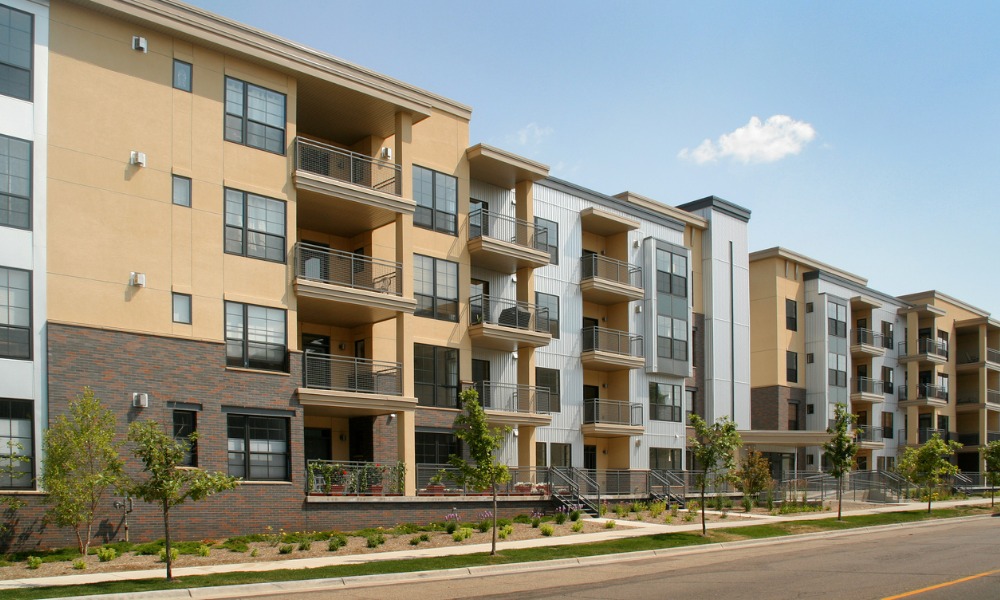National rent growth reaches lowest point in over two years

The pace of rent increases in Canada has slowed down to the lowest rate in over two years, according to the latest data from Rentals.ca and Urbanation.
The average asking rent for all residential properties in July climbed 5.9% year over year to $2,201 per month, marking the slowest annual growth rate in over the past 31 months.
While rents did increase by 0.8% month-over-month in July, this followed a decline of the same magnitude in June, suggesting a plateau in rental costs.
“As we move past the peak of summer, we’ve seen very little of the uplift typically expected with the warmer months,” Rentals.ca senior analyst David Aizikov said in the report. “However, as the weather cools and days become shorter, rental demand typically slows which may further slow market rent growth.”
Cooling markets
Two of Canada’s priciest rental markets, Toronto and Vancouver, showed mixed results. Toronto’s average rent saw a slight monthly increase of 0.2% but was down 4.6% annually, settling at $2,719. Vancouver experienced a 1.9% monthly increase but a notable 7.2% annual decline, with average rents at $3,101.
Edmonton led the major cities in rent growth, with a 14.3% year-over-year increase to $1,579. Calgary’s rents grew by 3.7%, reaching $2,111. Montreal’s average rent fell for the third consecutive month by 0.5% to $2,003, although it posted a modest 0.8% annual rise. Ottawa’s rents increased by 4.1% year-over-year to $2,218, the second-highest rate of growth in the month.
Saskatchewan stood out as the fastest-growing province for rent increases, with a 22.2% rise in the average rent for purpose-built and condominium apartments over the past year, now averaging $1,331. Despite this, rents in the province saw a slight monthly decline.
Read next: Quebec closes recovery chapter, housing market poised for growth
In contrast, British Columbia and Ontario were the only provinces where overall rents decreased annually, with BC down 2% to $2,570 and Ontario down 1.5% to $2,396.
Shared accommodations
Shared accommodation listings recorded a 9.1% annual increase in asking rent across four provinces, reaching an average of $1,005 in July, the highest average rent of the past five months.
Roommate rents in Toronto declined 0.3% monthly and 4.9% annually to $1,232, while Ottawa saw a 0.3% monthly increase but a 1.2% annual decline to $941. Calgary led the growth in roommate rents with an 8.9% annual increase to $923, while Vancouver remained the most expensive city for shared accommodations at $1,476, up 1.4% annually.
The report also highlights the performance of different property types. Purpose-built apartments saw a more substantial year-over-year increase of 8.9%, compared to a 1.9% rise in condominium apartment rents.
Meanwhile, studio apartment rents exhibited contrasting trends, with purpose-built studio rents surging 13.7% while condominium studio rents declined by 2.8%.
The increasing availability of rental units in some areas, coupled with economic uncertainties, has given renters more negotiating power. This shift in market dynamics is expected to continue influencing rent growth in the coming months.
Factors contributing to the moderation of rent growth include increased housing supply in some areas, changes in population migration patterns, and economic conditions.
While the overall rental market is cooling, it’s essential to note that affordability remains a significant challenge for many renters. The rising cost-of-living, combined with increasing rents, has put a strain on household budgets.
Make sure to get all the latest news to your inbox on Canada’s mortgage and housing markets by signing up for our free daily newsletter here.



